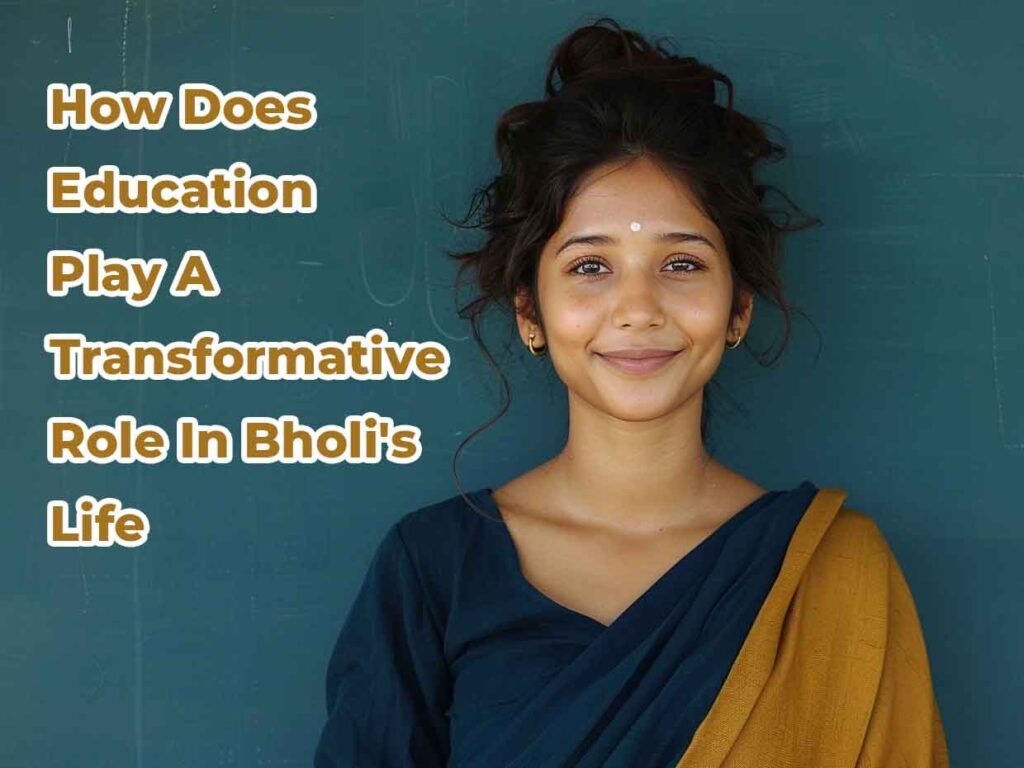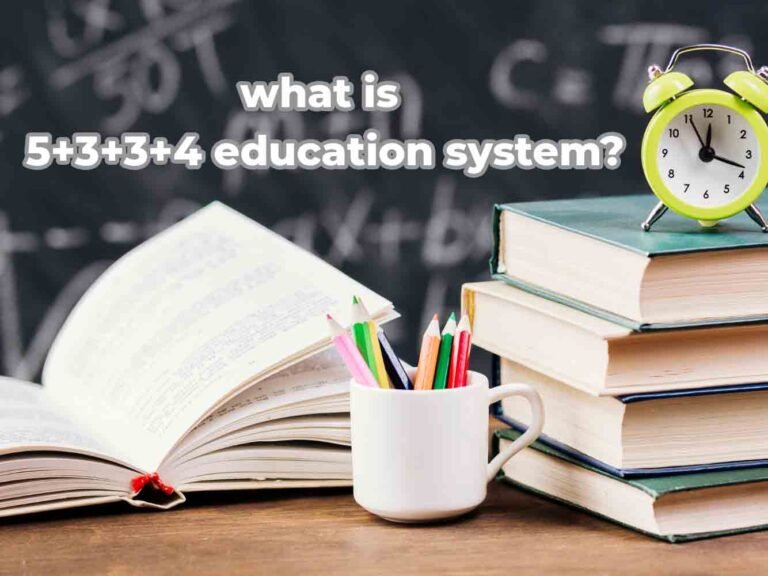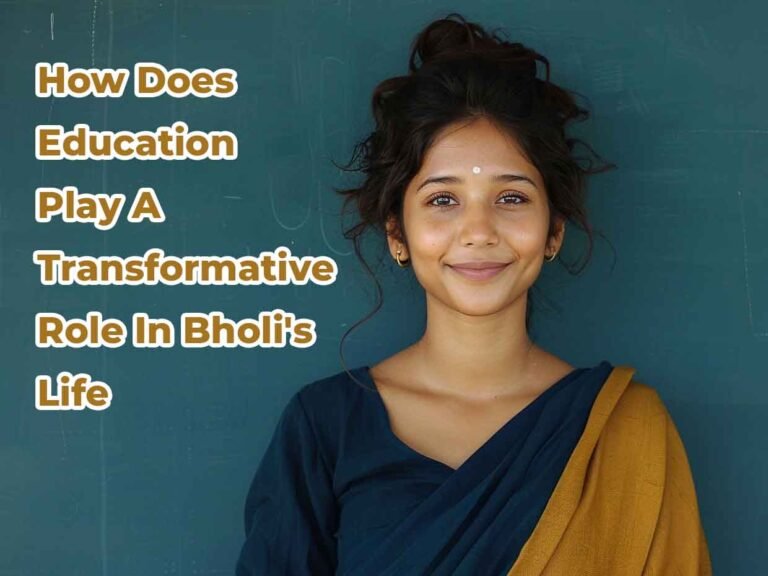Introduction
For Bholi, a character from K.A. Abbas’s short tale “Bholi,” education acts as a potent catalyst for change in her life. Originally considered as a timid and impoverished girl, Bholi’s life is full of emotional and physical challenges including a speech impairment and inadequate self-confidence. Her family’s neglect of her aggravates her sense of inadequacy. But when Bholi gets the chance to attend school, her life starts to change. Learning not only gives her knowledge but also enables her to find her voice, therefore arming her with confidence and self-worth. This path of metamorphosis emphasizes the great influence education can have on a person’s life, particularly for individuals who society ignores or marginalizes.
Bholi changes significantly personally as she pursues her degree, therefore influencing her fate. The previously quiet and terrified girl develops into a self-assured young woman who questions social mores and defends her rights. Education gives her the means to escape the bonds of injustice and ignorance, so enabling her to see a time when any one thing will not limit her. The narrative of Bholi is evidence of the transforming potential of education since it shows how it may inspire self-respect, empower people, and help them to take charge of their lives. By using education, Bholi not only changes her own life but also motivates others to see their possibilities.
How did Bholi’s teacher play an important role in changing the course of her life?
The instructor of Bholi was very important in changing her life. Bholi lacked confidence and self-esteem as a young child who was previously laughed at for her speech difficulty and appearance. But her teacher noticed her potential and transcended these outward defects. The teacher gently and patiently guided Bholi’s mind and spirit, helping her to find inner strength and express herself. The teacher helped Bholi get over her worries and insecurities by establishing a sympathetic and forgiving surrounding.
This fresh confidence enabled Bholi to stand up for herself, so transforming the path of her life. Bholi came to see she was more than what people thought she was, thanks in great part to the teacher, and this insight put her on a road of self-discovery and strength.
What is the transformation of Bholi?
From a shy, self-conscious girl to a confident and aggressive young woman, Bholi has changed profoundly. Bholi is first shown as a girl with poor self-esteem brought on by her speech problems and appearance. Her target of ridicule is made by these difficulties, which causes her to withdraw inside herself. But Bholi starts to transform under the powerful power of education and the loving direction of her instructor. She picks up reading and writing, abilities that not only academically broaden her world but also provide her the confidence to trust in herself.
Her metamorphosis reaches its turning point when she boldly turns down a marriage proposal that would have limited her to a life of slavery. Bholi’s path is one of self-realization whereby education turns into the key opening her actual potential and enabling her to take charge of her life.
How does education play a transformative role in Bholi’s life Teachoo?
In Bholi’s life, social and personal change is sparked by knowledge. Reading and writing give Bholi strength she never would have imagined. Bholi was perceived by her family and community as a burden before she started school, frequently disregarded and underappreciated. But Bholi develops self-worth and identity once she begins learning. Her education gives her the ability to make wise decisions and think critically, which finally helps her to rebel against social conventions trying to subjugate her.
In Teachoo’s framework, education develops critical thinking, self-awareness, and the confidence to question unfair policies rather than only imparting intellectual information. For Bholi, this education helps her to become an active agent of change from a passive observer in her own life.
How did education change Bholi’s personality?
Education caused Bholi’s personality to change dramatically. At first, Bholi is shown as a quiet, reclusive girl who suffers from confidence loss from her stutter and appearance. She suffered much with her self-esteem since she was used as less than. Bholi starts to perceive herself differently, though, when she starts her studies.
Her acquired knowledge in the classroom gives her confidence and direction. Her speech starts to get better, and her clarity increases as well, which raises her confidence. The once-timid Bholi develops into a powerful, self-assured person not shy to express her ideas. Her perspective on life is changed by education, which also gives her the confidence to challenge society’s expectations, and so she serves as a model for others in her neighborhood.
What is the role of the teacher in Bholi’s life?
In Bholi’s life, her teacher serves as a mentor, adviser, and transformational catalyst. She is rather important in enabling Bholi to release the bonds of societal expectations and self-doubt. Unlike others who considered Bholi as a burden, the teacher patiently and sympathetically cultivated her potential. Beginning with the fundamental ability of reading and writing, she gave Bholi the tools to develop confidence. More crucially, the teacher instilled in Bholi the conviction that she was capable of far more than what others had limited her to.
Bholi realized her value and asserted her rights thanks in great part to this support. Beyond academics, the teacher became a lighthouse of hope and empowerment, guiding Bholi toward a time when she might stand on her own terms.
The Tehsildar was an agent of change in Bholi’s life. Justify!
The Tehsildar is a significant agent of change in her life since his choice to send Bholi to school starts her journey. The Tehsildar, a government official, was assigned to make sure every youngster in the hamlet—including Bholi—had an education. His determination to get Bholi enrolled in school marked a turning moment since it placed her on the road toward eventual empowerment.
Although Bholi’s parents were at first reluctant, the Tehsildar’s involvement guaranteed Bholi had access to education. This choice had far-reaching effects since it not only gave Bholi the means to escape social limitations but also questioned the general opinions about the education of girls in society. In this sense, the activities of the Tehsildar were absolutely vital in changing the course of Bholi’s life.
How did education change Bholi’s personality? Explain.
By arming Bholi with the confidence and tools she needed to overcome her fears, education completely changed her personality. Bholi was shy, quiet, and self-conscious before she attended school. Her stutter and alleged lack of beauty made her the target of ridicule, which made her even more inadequate. Still, education gave her fresh ideas about life.
Bholi started to feel the lost self-worth when she picked up reading and writing. Her confidence grew as her acquired knowledge helped her to express herself more clearly. This fresh confidence lets Bholi stand up for herself and make wise decisions based on her best interest, so transforming the shy young woman she used to be. From a passive observer in her own life, education helped Bholi become a confident, forceful person.
Why is Bholi’s Father worried about her?
Because of her linguistic and physical disabilities, Bholi’s father worries greatly about her future. Being a dad, he worries about how society views her and the possible challenges she could have in life, especially in relation to marriage. In a society where a woman’s value is sometimes determined by her attractiveness and fluency, Bholi’s stammer and apparent lack of beauty cause her father much worry. He worries that she might be a lifetime burden on the family if she does not find a decent husband.
The pressure from society to marry off daughters in order to guarantee their future aggravates this concern. The worries of Bholi’s father underline the difficulties she has to overcome since they mirror the general society’s views on females who deviate from the normal criteria of beauty and competence.
Does Bholi enjoy her first day at school?
Bholi’s first day of classes combines discovery with anxiety. She is first afraid and not sure what to expect. She has been shielded and laughed at for much of her life. Hence, she finds it intimidating to enter new surroundings. She had never felt it previously, but once she got to school, she started to feel like she belonged. Her anxieties are lessened by the friendly environment of the school and the kindness of her instructor. Bholi feels loved and appreciated for who she is for the first time instead of being criticized for her looks or speech.
This good experience signals the start of Bholi’s metamorphosis since she begins to view education as a venue for her development and flourishing. Bholi appreciates her new surroundings at the end of the day and looks forward to going back.
Does she find her teacher different from the people at home?
Indeed, Bholi finds her teacher to be rather unlike the folks she lives with. Bholi’s physical appearance and speaking problems cause people to treat her at home either with sympathy or apathy. Though not unloving, her family does not provide her with the support she requires to increase her self-confidence. By contrast, Bholi’s teacher is caring, gentle, and patient. She makes a deliberate effort to highlight her best since she sees possibilities in Bholi that others have not noticed.
Unlike the folks living at home who highlight Bholi’s flaws, the teacher supports her in developing her assets. For Bholi, who starts to regard her teacher as a mentor and role model, this extreme disparity in treatment has a significant influence. The teacher’s empowering and encouraging style stands in strong contrast to the contemptuous views Bholi faces at home, therefore underscoring her part in her change.
Bholi had many apprehensions about going to school. What made her feel that she was going to a better place than her home?
Bholi’s first concerns about attending classes arise from her prior experiences of being teased and from her uncertainty about the future. But as she finds the friendly surroundings of the institution, her view starts to shift. The school gives her a place where she is appreciated, unlike her house, where she often feels like a burden because of her alleged flaws. This change is much influenced by her teacher’s compassion and support. Bholi believes, for the first time, that she is in a situation where she can be herself free from anxiety about criticism.
She realizes that school is a place of development and possibility when she gets positive reinforcement from her teacher and feels accomplished upon learning something new. This insight enables Bholi to go past her first anxieties and welcome the concept of school as a means to a better future.
How did Bholi’s teacher play an important role in changing the course of her life?
By giving Bholi the means and confidence to reject society’s standards, her teacher significantly helped her to go off the path in life. Despite her linguistic and physical disabilities, the teacher saw Bholi’s potential and set out to assist her in discovering it for herself. The teacher helped Bholi get the confidence to speak up for herself and take charge of her fate by means of patience, encouragement, and a sincere conviction in her capacity. Beyond only imparting knowledge, the teacher became a mentor for Bholi navigating the difficulties of growing up in a society that routinely discounted her as useless.
The teacher started Bholi on a road of self-discovery and empowerment that finally turned her life around by enabling her to believe in herself. Without the teacher’s help, Bholi would have been caught in a life of slavery, but instead, she became a strong, independent person capable of determining her own future.
Conclusion
The life of Bholi is evidence of the transforming power of knowledge and the great influence a good mentor can have on a person. Thanks to her education and the support of her teacher, Bholi—a shy, self-conscious girl—becomes a confident and assertive young woman. Her narrative emphasizes the need for education to enable people to fulfill their full potential and escape social restrictions.
FAQs
1. What is the main lesson from Bholi’s story?
The narrative of Bholi reminds us that education is a great instrument that may help people overcome obstacles and realize their potential, therefore transforming their lives.
2. How does Bholi’s teacher influence her life?
The support, encouragement, and confidence Bholi’s instructor gives her will her life to believe in herself and challenge society’s standards.
3. Why was Bholi initially apprehensive about going to school?
Because of her anxiety about being teased and the strange surroundings she was about to join, Bholi was first reluctant about attending classes.
4. What role does the Tehsildar play in Bholi’s education?
By insisting that Bholi be sent to school, which signals the start of her change via education, the Tehsildar performs a vital role.
5. How does Bholi’s perception of herself change after receiving an education?
Following an education, Bholi’s view of herself shifts from one of burden to one of value and potential, which helps her to grow to be a confident and assertive person.






















